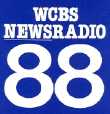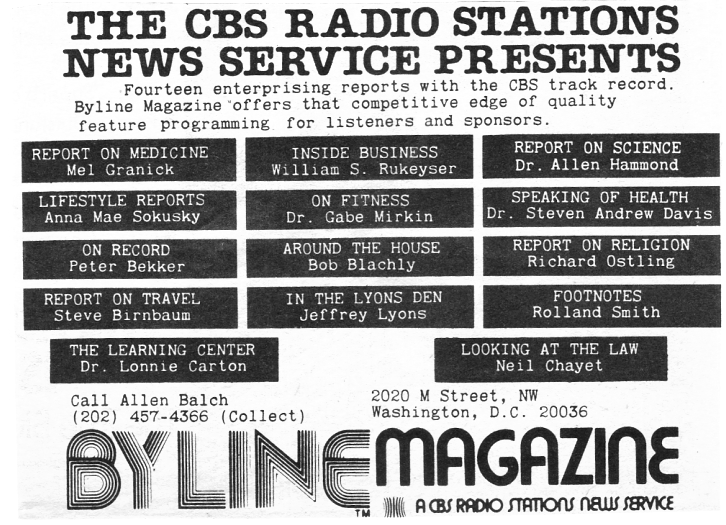 |

by Wes Vernon, former Washington Correspondent
|
My mentor in broadcasting told me years ago that in the news business, you'll never have a dull day in your life. That may not be universally true, but it surely applied to the years of the CBS Radio RSNS operation in Washington. Whether it was Watergate, two wars, six presidencies -- the biggest history-making events of the last quarter of the 20th Century--we were there until CBS--by then under new ownership pulled the plug in 1997.
RSNS--known as PLNX (Private Line News Exchange) in its early days as a news operation--was created for the express purpose of serving as a Washington Bureau for the CBS-owned radio Stations, which were mostly all-news.
 click to enlarge--image courtesy Bob Gibson click to enlarge--image courtesy Bob Gibson
Its first top executive or Director was John Callaway. He came to New York from Chicago's WBBM where he had been a protege of Van Gordon Sauter, who later went to the top at CBS News. Callaway set up PLNX headquarters at Black Rock in the early seventies and appointed Jim McCarthy -- who had been WCBS Washington Correspondent since the inception of News-88's all-news format as Bureau Chief for the PLNX Washington bureau. That was when McCarthy -- with Callaway's approval -- hired me to complete the two-man team that would report for all the owned and operated stations. Calloway was succeeded the following year by Jonathan Ward.
When Ward left to become a producer for The CBS Evening News with Walter Cronkite, Joe Durso, Jr. -- who had been Editorial Director for News-88 -- assumed the top PLNX position in 1974. Durso, son of a respected sportswriter for the New York Times, wanted to be more involved in the Washington bureau's day-to-day operations. Having been raised in a journalist household, he definitely had it in his blood. To that end, in 1975 he came to Washington and consolidated PLNX headquarters with the D.C. bureau at the CBS building at 2020 M Street.
Durso's arrival led to an expansion of the PLNX bureau's physical operations. McCarthy and I had been pretty much on our own. We had operated at the mercy of the radio engineers at CBS News (whose priorities were with network operations). This was a continuation of the arrangement under which McCarthy had operated when he reported solely for WCBS. When Durso came to our shop, he set us up for the first time with our own studios and engineers. That may seem elementary, but to us it was a major advance. I couldn't begin to recount the lengthy waits for help in cutting tape for our feeds during those first three years. Durso brought along Ana Mae Sokusky, an editor/producer with KCBS in San Francisco, as his assistant or Executive Producer.
In 1980, McCarthy left to spend fulltime with his business in his hometown of Wilkes-Barre, Pa., and was replaced by Les Woodruff, a 12-year veteran of WEEI in Boston. By then, Durso had pondered the question of giving the operation a name with a more descriptive panache. That is how PLNX became the CBS Radio Stations News Service (or RSNS).
When Durso departed for Chicago to become News Director of WBBM, Sokusky moved to the top spot in the bureau, with Jerome Navies moving to D.C. from KNX in L.A. to assume the number two job of Executive Producer. When Sokusky moved on in 1985 (ultimately to a VP position with the CBS Radio Division) Navies became Director of RSNS until the day it ceased operations in early 1997. During his time at the helm, he had as his assistants Chris Berry (from KNX, now an executive with ABC and currently managing WMAL in Washington), Arleen Bolton (from KCBS), and Robert Garcia (who later went to CNN).
It was a sad day for us at the bureau when Les Woodruff died unexpectedly during the Thanksgiving weekend of 1994. Les loved life, and we all grieved over his departure. He was succeeded by Pam Coulter (who had reported and anchored at all-news WTOP, the CBS affiliate in Washington, and is now a correspondent for ABC). Pam had done some part-time work for us for two or three years.
In addition to day-to-day reporting for the CBS-owned stations plus others that bought into the service, the RSNS bureau produced the taped By-Line features which went not only to stations within the CBS family, but to many other subscribers as well. "Lifestyle Report," "Looking At the Law," and "Book Beat" were among the most popular. Throughout all these years, PLNX/RSNS produced the twice-weekly taped interview program, "Crosstalk." It actually had been established when Callaway and Ward were running things in New York before the Washington bureau opened. During those early days, the guests were mostly authors. After the Washington consolidation, I and others rotated as hosts, and the program included not only authors, but also congressmen, senators, governors, foreign heads of state, and ambassadors---just about anybody who was in the news or had an interesting story to tell. "Crosstalk" was slotted primarily on the CBS-FM stations, though it had AM exposure in some cities.
In the early nineties, Navies made an arrangement with CBS News whereby the third floor of 2020 was completely remodeled to accommodate both RSNS and the CBS Radio Network News, which meant larger facilities and state of the art equipment. The computer age advanced significantly in that era. During the interim construction period, we operated in several makeshift studios, including a construction trailer right next door to the building. It was an interesting time, but we did not miss a beat in our regular coverage.
Like many other departments at CBS in the eighties, RSNS had to cope with the nagging question of mere survival. While Larry Tisch appeared to be firing ten people before breakfast, so to speak, we figured our best plan to stay afloat -- and not incidentally, keep our jobsãwas to stay out of his way as much as possible. To that end, one RSNS official discouraged an assignment editor from walking up to Tisch and introducing himself at a reception preceding the annual Washington dinner of the Radio-TV Correspondents Association. People at Black Rock who wanted us to survive tried to keep us under Tisch's radar.
For the 25 years of its existence, RSNS covered not only day to day events at the Capitol, the White House, and government agencies, but also governors and mayors meetings in and out of Washington. We were there for inaugurations (I had a ball covering the 1989 Bush inaugural parade for WCBS), protest demonstrations, hostage situations, plane crashes in Washington and nearby states, anything the stations wanted. Durso once compared us to Chicken Delight. Similar to flexibility of the fast food chain, he said, we offered news "made to order" for the desire of our client stations.
RSNS probably reached its highest visibility in the 1991 Persian Gulf War when we went full force with "CBS Radio Update" reports twice each hour on everything related to hostilities, including White House and Pentagon briefings, key events on the Hill, reports from the front with CBS News correspondents and WCBS's own reporter on the scene. Most of the Update broadcasts originated either from WCBS-N.Y. or RSNS-D.C.
We covered all the major national party political conventions from 1972 through 1996. Starting in 1976, my convention assignment was to cover the New Jersey delegations (both the GOP and the Dems) for NewsRadio-88-NY.İ In 1980, for example, I worked with the late Steve Flanders (who reported on New York delegates) and Jane Tillman Irving (who was with the Connecticut pols)
Some have said political conventions aren't as interesting as they were in the days of the "smoked-filled rooms." It's true that by the time of the conventions, the primaries have usually decided the nominee. But I've found that if you get a few thousand of the political movers and shakers from all over the country under one roof, there is no way you can get out of there without tripping over several good stories. Maybe it's the political pageantry that helped to motivate me, but I lived for the political conventions, never grew tired of them. They are easily the fondest of my many pleasant memories of 25 years with RSNS.
return to main WCBS Appreciation Site page
|

